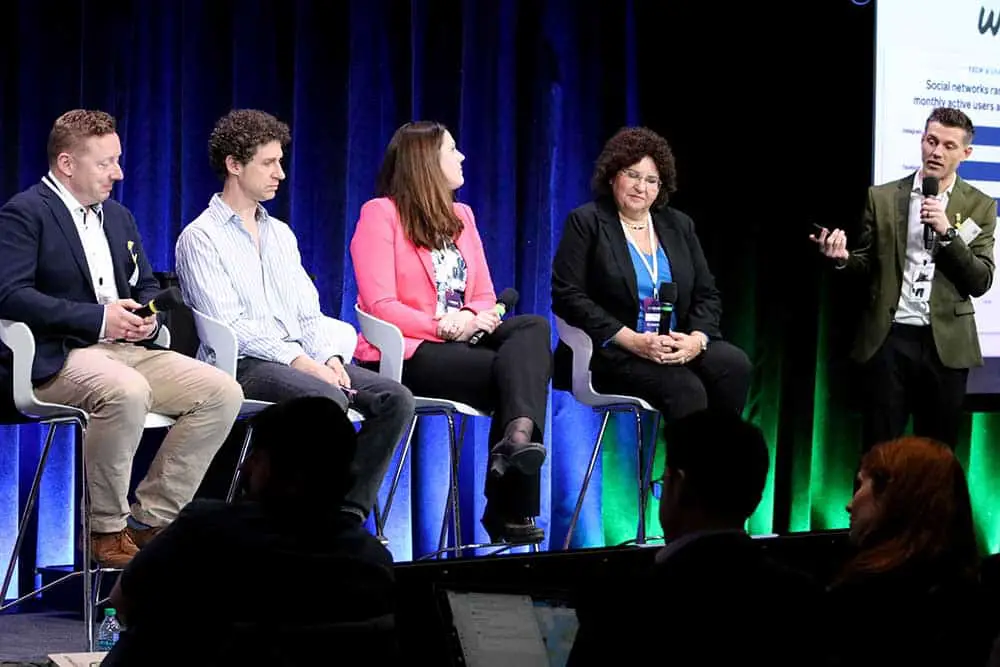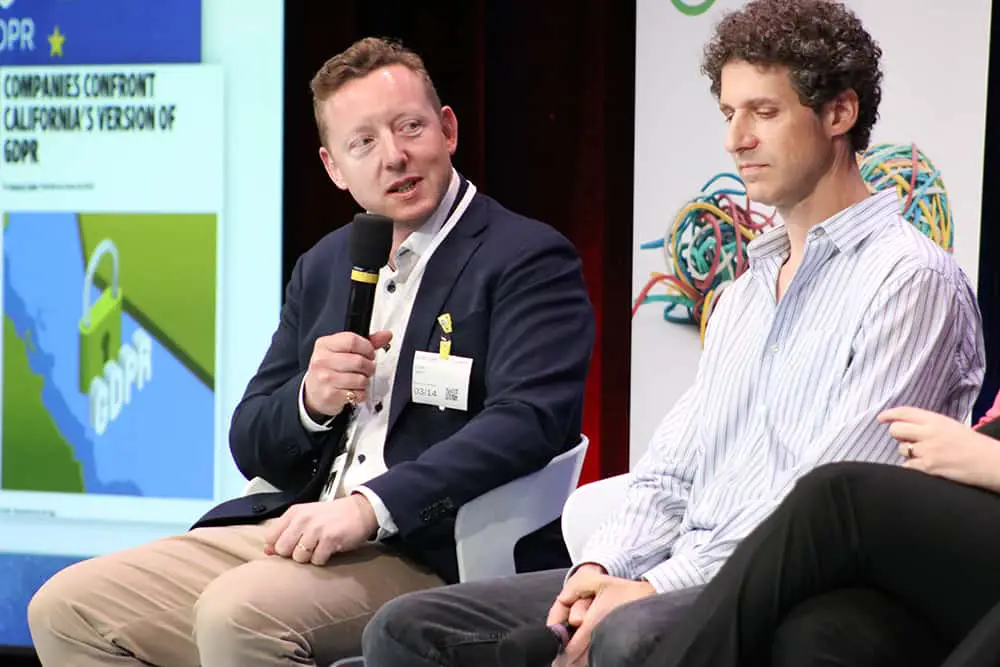
Digital Publishing Experts Outline The Future Of Publishing
Get helpful updates in your inbox
Digital Publishing Experts Outline The Future Of Publishing
At Pubtelligence, a digital publishing event hosted at Google in New York, attendees had the opportunity to hear industry leaders discuss hot topics in digital publishing and ask pressing questions to digital publishing experts. Topics included AMP, PWAs, social networks, regulation, digital ad rates, SEO, and much more.
The “future of publishing panel” was hosted by Head of Marketing at Ezoic, Tyler Bishop, and included:
- CCO of Ezoic, John Cole
- CEO of Yoast, Marieke van de Rakt
- Developer Advocate for Google, Ben Morss
- CEO of Small Business Trends, Anita Campbell
You can watch the entire panel discussion here or you can read each question and a summary of the digital publishing expert’s responses below.
Questions about the future of publishing…
Below are summarized answers from our digital publishing experts from questions they were asked directly by our moderator or by members of the audience. The audience included approximately 160 digital publishers from major brands to independent bloggers.
More video for publishers in 2020 and beyond?
Digiday Research shows that 62% of publishers plan to spend more on video production this year. Agree or disagree?
Anita: As a publisher, I would have to disagree with this, unless you’re a YouTube publisher or a really big publisher.
Marieke: We are doing more video at Yoast now. My 12-year-old son doesn’t even search on Google, he searches on YouTube. I think you need to do some video to address that younger age group, but it’s not for every niche. It’s a lot of work–we have a studio with a green screen. If you’re going to do it, you need to put an effort into it, just like written content.
John: I think it’s generally a good thing. If you can get video content out, then do it.
Are native apps becoming obsolete with AMP and PWAs?
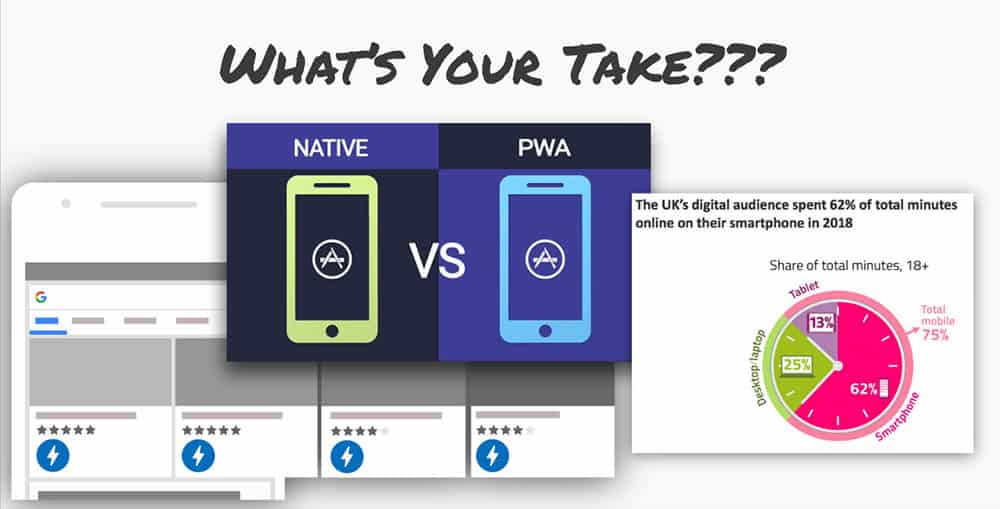
Ben: I’ve seen various articles asking “ will it replace native apps?” The answer is, I don’t know if it’s going to happen. I think you should try it though. If you can pull it off, instead of having an app that has to be installed for iOS or Android, and then the discovery of the app, and then also running your mobile site, you could have one site for everything. It could save you a lot of time if you do this right, so it’s worth trying.
John: I think content discovery for native apps is really tough. If you’re a content producer trying to get people there, then download an app, and then use that to access your content, that’s hard. It works if you’ve got a brand, but I think but if you’re providing content in the search results, PWAs are the way to go. I do think it’s gonna be better for the user.
Which social networks will be helpful for publishers in the future?
Social network popularity is constantly in fluctuation and for platforms like Facebook, it is declining, while Instagram is growing. Do you see the ‘musical chairs’ of social networks continuing or do you think one will be the most relevant and beneficial to publishers?
Marieke: Facebook is declining in the U.S. and in the Netherlands but in other places, it is still growing. I think Instagram is getting more important but that’s really hard, at least for us (Yoast) it’s really hard to get traffic from Instagram.
We don’t have many followers either. We have Facebook but we got the most traffic from our plugin, our newsletter, and organic search. You just need to be on social, I guess because everybody expects you to be. It is important for keeping up the brand though. It is hard though; it’s been hard since Facebook has been declining.
Anita: I think it’s very niche-specific and it depends on what your goals are. Everybody’s hot about Instagram, but it’s like Marieke said, we (Small Business Trends) can’t get any traffic from it. Interestingly, we still do well on Facebook, Twitter, LinkedIn, and Pinterest surprisingly. However, when you think of it, Pinterest is essentially a bookmarking site, so for us that works really well.

Ben: As Anita said, Facebook is pretty dominant in various parts of the world. In places like Indonesia and countries in Africa, generally, the standard thing you do on your phone is go to Facebook.
John: I think also because in those emerging markets, the infrastructure isn’t as good, so if you’ve got a big platform and they’re really good at caching locally then you’re going to get a good response. I have seen publishers get traffic from Instagram, but it’s quite hard. You have to have a big arrow going down to the bottom of your mobile site saying ‘click here,’ and then it takes you to the site.
However, I think you just have to be on there and see which way it’s going to go. If you consider Facebook about three years ago, everyone was jumping in and there were Instant Articles, but since it’s in the decline I have seen many publishers lose most of their traffic or they now have to pay for it.
LEARN MORE ABOUT EMERGING SOCIAL STRATEGIES FOR PUBLISHERS HERE
Are “stories” going to be a thing?
Stories on social media are becoming continually more popular and are emerging as the way younger people want to consume their news. What role do you think stories may take in publishing in the coming years?
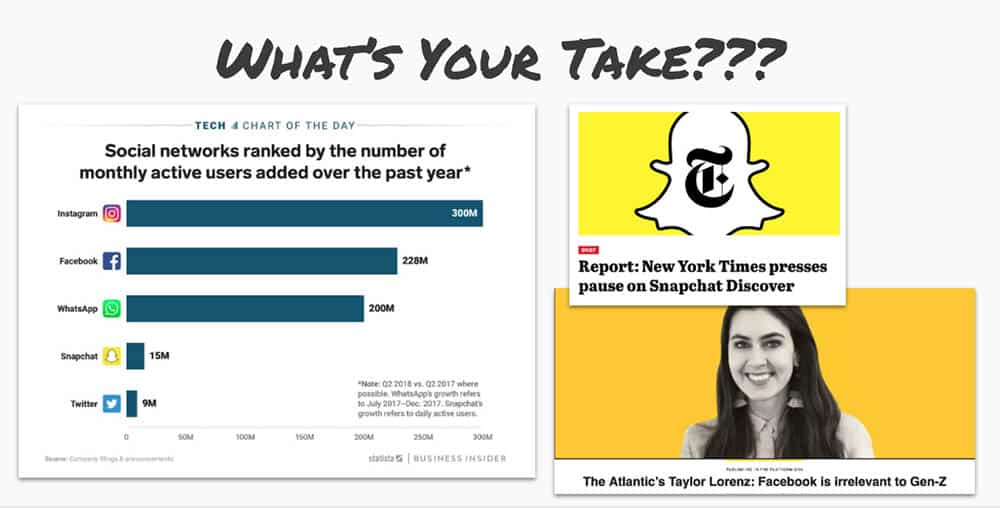
Ben: They’re being tried in various places; AMP has stories now and they’re being monetized in new ways. Google search will make stories automatically over certain topics, so it’s a thing being tried out in various places on the web.
Will digital publishing see more regulation soon?
Where do we see regulation, like GDPR, ending or where do we see it trending in the near future?
Marieke: As a European, I can say I think it confuses people. GDPR has a lot of consequences in our daily life, not only on the internet but everywhere, and nobody knows exactly what you’re allowed to do. In my children’s school, we’re not allowed to exchange addresses anymore because the school is afraid of GDPR fines.
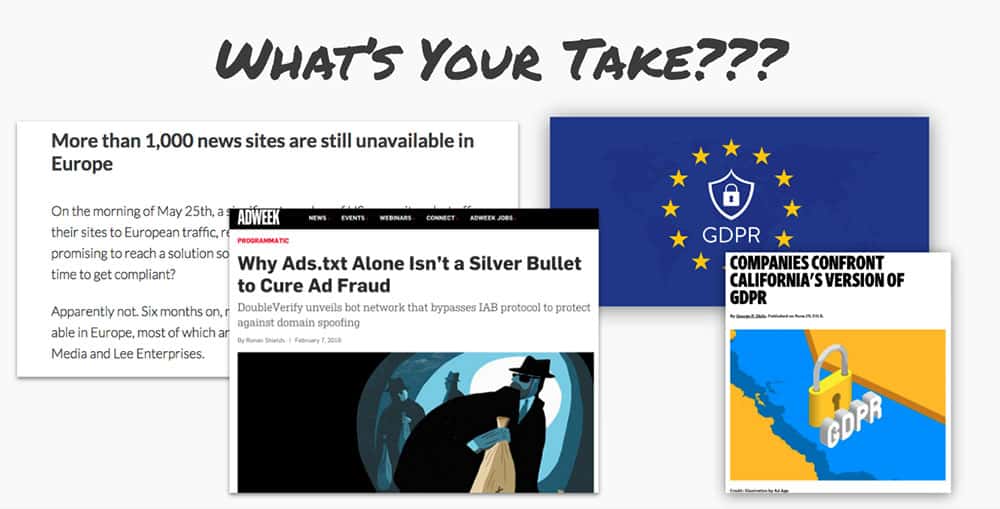
Ben: The problem with these things is you often see a box saying ‘I consent to the terms and conditions of this site’ and you’re like, ‘I don’t know what these things mean.’ It’s like going to the doctor and you have six pages of forms, and you just kind of sign it all without looking through everything.
I think this is similar and it’s unfortunate; you go to a site saying ‘I’ll use cookies’ and you don’t know what cookies are. It’s just unfortunate because data privacy is pretty important but it’s hard to actually make it make sense to people.
It may become even more important as people realize their data is being collected and sold in various ways. As a result, you may see apps and the web change in fundamental ways, and even monetization, because it may be impossible to exchange people’s information without their consent; maybe cookies will be harder to use.
For example, Safari has blocked cookies in various cases from third parties. Things might change a lot or not at all. It’s hard to predict. I will say that in general, as Apple does ITP 2.0 for example, and as people are more concerned about these things in the US and especially in Europe, that Google wants to keep publishers publishing and making money.
John: As someone from across the pond, I can say that it’s not quite the apocalypse that everyone thought it was going to be for ad rates or publishers. I think it was good, as it has a data handling element and a data owning element.
Getting this ‘opt-in’ isn’t that hard–it’s just something that pops up, you pass the result back, and then keep a record of the result. It’s better to have some sort of record regulation because it seems like when the platforms are allowed to do things on their own such as the Cambridge Analytica/Facebook issue.
I think that the federal government will deal with it in the United States and then everyone else will get involved. Now, it’s going to be more fines in Europe, so I think it’s all just going to be another cost of doing business around the world. What we’ve heard from Google is that if you’re showing Google ads to users in the European Union and you don’t have a consent module, then you do risk being basically turned off of AdExchange. You know, you had a whole year to get your act together to put something up, so that’s fair enough.
Anita: I think as far as websites and advertising, having some sort of a consent module has been kind of a non-issue. Where I think it has impacted websites are those who do lead gen. For example, when you go to download an ebook, typically people offer an ebook through lead gen because they want to collect the email addresses.
So at Small Business Trends, we might get a sponsor and do an ebook and want to be able to pass along the information to a sponsor. Well, you can’t do the little auto checkboxes or the statements with no checkboxes anymore, where you just had a little statement that said ‘you may get promotions.’ So actually that’s become more problematic than the ads.
MORE ABOUT PUBLISHING TRENDS IN 2019 HERE
How will cookie-blocking affect digital publishers?
Apple is releasing a new update that will block first-party cookies, as well as third-party cookies. Let’s pretend there’s a cookie-less internet; how will this impact display advertising?
John: Retargeting is where advertisers get the best bang for their buck; if you can’t cookie or retarget people, and you only have the content context to do any targeting, it’s going to get pretty difficult. It’s actually going to be a real pain for the users because when you go to a site, you don’t want to have to keep answering all these questions about cookies, especially if you have gone to that site ten times this month.
I think that there’ll be a backlash from the users more than from the industry. If we had to go back to contextual targeting, the value would shift to publishers even more. That’s the only lever that a publisher can offer an advertiser in that case, and can you know can publishers offer that better than Adsense? Probably not.
I just think it’ll be two steps back in terms of the evolution of having a good user experience and be able to make money online. Hopefully, we can get the regulations to calm everyone down so that it becomes usable and doesn’t make things impossible to use online
Ben: So much now works on these one-by-one invisible pixels being sent that then send people’s information via headers; it’s a tiny, weird corner of the web. Third-party cookies just kind of work because it is kind of working. These weird, little corners of the web fund this giant industry and I think they will find more weird, little corners.
Are podcasts the next big thing in publishing?
Is audio, such as podcasts and voice search query, a new avenue for digital publishing and something that they should be paying close attention to?
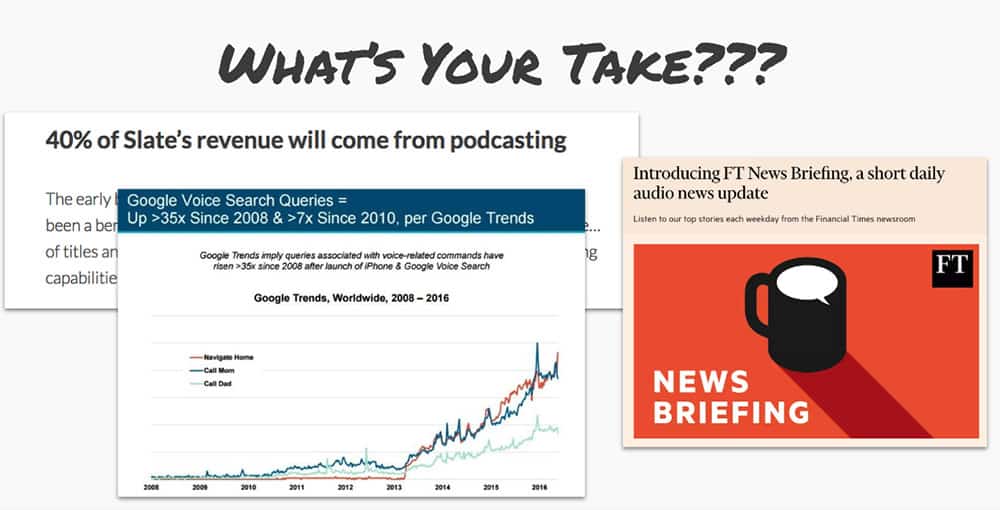
Marieke: I think so but, I don’t think it’s necessarily related to Google voice search. I see a lot of people podcasting and I think they all got great traction out of that. I do see that as a trend, and voice search is rising in popularity, but I don’t believe in voice search except for practical search queries.
But, if you want to read a very lengthy article, then you want to be able to choose between content and mediums. I could see it working if you could voice search but have a screen still there, but my Google Home only gives answers to practical questions.
Ben: I think having a screen certainly helps; if you say ‘Google, how do I make chicken cacciatore?’ it will read the whole thing off to you and you will forget it. However, my kids do a lot of a voice search if they’re doing their homework; they’ll say ‘OK Google, what’s 14 times 27?’
Will digital spending from advertisers continue to grow?
Digital ad spending is continuing to take over traditional ad spending, specifically through programmatic ads; is there going to be an end to this or a shift?
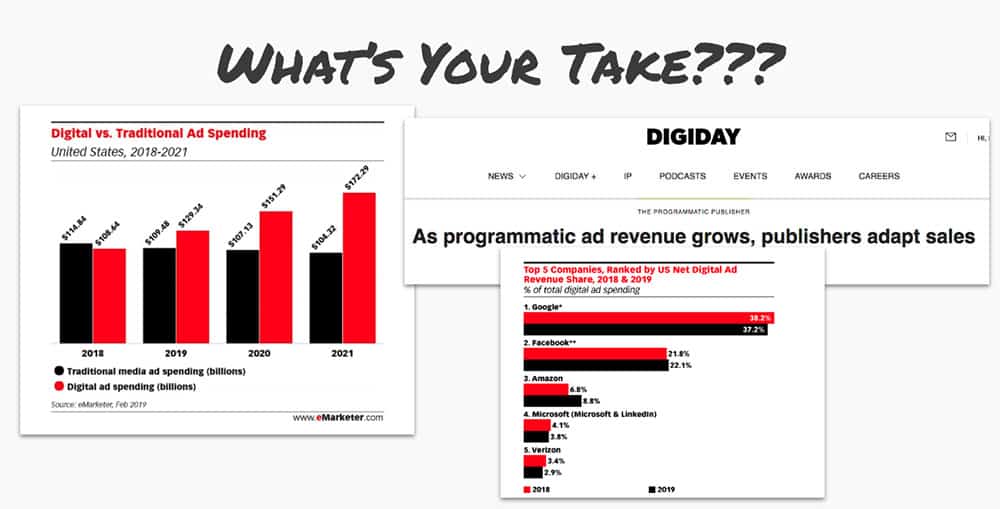
John: When you have a search monopoly and the biggest ad exchange, these things actually give you the opportunity to potentially create other monopolies, which is the definition of a monopoly I guess. It’s been talked about, such as Democratic candidate Elizabeth Warren who said that she would like to see a break up of these monopolies.
I don’t know if that’s necessarily going to happen in America. But will digital ad spending continue? Yes; I don’t see it changing. I think Google’s first-price auction that just came out last week will further strengthen Google’s position to be able to provide value for advertisers and publishers, so a lot of intermediaries who are in that environment are going to be knocked down. I just think that’s evolution though; you shouldn’t have people involved who are not adding value.
Ben: I think, in general, it’s unfair to have monopolies. My concern is, if you break up Google, Facebook, or Amazon, all these other companies are there who will just eat them up.
How will Google’s search results affect publishers in the future?
SERPs (search engine results page) are always evolving. When people discuss search algorithm updates, they often aren’t considering that a change in SERPs has the same amount of effect on publishers as a change in ranking. How do we see this continuing to evolve?
Marieke: I do think there will be more no-click searches as those answer boxes will change. In the Netherlands, we don’t have as many answer boxes because Google isn’t very good at Dutch, so we have a high organic CTR because we have fewer answer boxes. Spaces for organic results are decreasing though, so that’s not a good thing.
Anita: For publishers, it can be very concerning, but I think it’s for certain types of publishers. If you are a publisher who gives short bits of factual information, I think having these answer boxes could be pretty scary. But if you have more in-depth analyses and offer much more value than simply answering a factual question, then I don’t see those as any kind of problem.
In fact, if there’s an option to click through, they’ll click through.
READ MORE ABOUT GOOGLE AND KNOWLEDGE GRAPH HERE.
Are paid subscriptions viable for online publishers?
More publishers are starting to explore paid subscriptions; is this a trend and can work for all publishers, or is it something that only works for a small percentage of publishers, like The Wall Street Journal?
John: I think brands have a natural advantage, but people are used to subscribing now to content, where they weren’t in the past –who’d have thought that subscriptions would come back? But if you look at Netflix and the success there, I think there is definitely a market for it, and certainly, magazines and newspapers need it.
I think for informational publishers that don’t have a brand, it’s very hard to get anybody to pay for your content and I think that the vast majority of users will not pay for it unless there is a specific brand bond. If it’s a niche and you can provide a ton of value, people will probably subscribe, but most people are used to getting things for free.
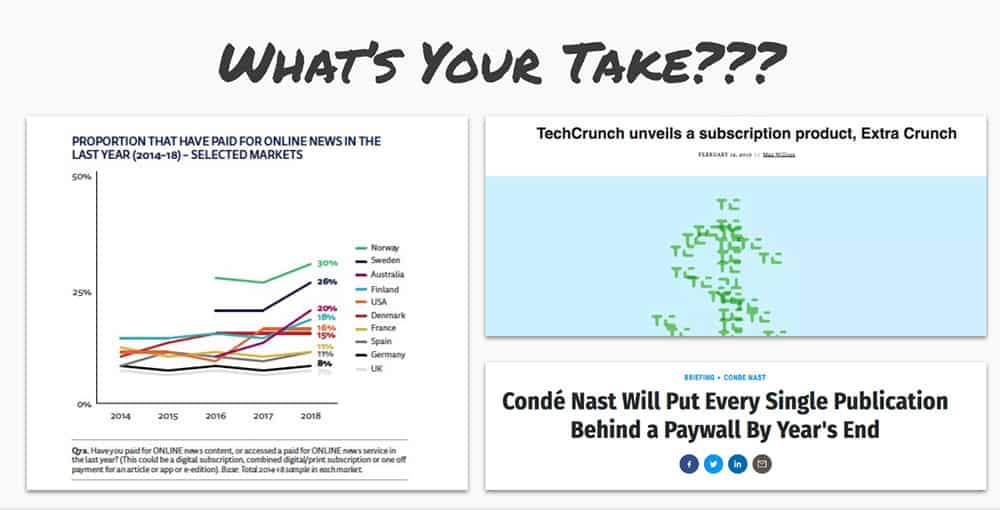
Marieke: It will make publishing more undemocratic. You could end up with a two-tier internet, which isn’t good.
Anita: I think for smaller publishers, it’s not going to be a good option unless you have such highly specialized information that no one can get anywhere else. There are some publishers who really are more like a personal brand and they have their following, so people may pay membership fees for them. But, that’s not really traditional publishing, it’s sort of a celebrity brand following at the micro level.
What will web personalization look like in the future?
Web personalization is a popular topic, especially at conferences and with some of the large brands, but when we start asking what that looks like, there are more questions than answers. What does web personalization mean?
Ben: AI is wonderful for various uses, like if you want to identify what’s in a photo, but I’m not sure it’s going to succeed in this particular area anytime soon, like personalizing anything based on some sort of knowledge of your browsing habits. I guess I could imagine, for example, if you were really good at chess and went to Chess.com.
If the site knew you were better at chess, it could serve you more advanced chess content right away.
John: I kind of agree with Ben about content, although I could see something like showing Marieke’s son a video because he is on YouTube so much becoming a personalization, whereas people like me don’t watch a lot of videos.
Another example is if I’m on a gigabit connection at home on my phone via Wi-Fi, and I want to get the full experience, maybe I shouldn’t see an AMP page because it’s more advantageous to show more features than less. I see personalization as treating people differently depending on features, not necessarily the user as a person. But, maybe look-alike users, like trying to improve things for them in some way.
LEARN MORE ABOUT HOW PEOPLE ARE DEFINING WEB PERSONALIZATION HERE
Rapid-fire questions to all the digital publishing experts
Is voice search a major threat to publishers?
A unanimous “no” from all expert panelists.
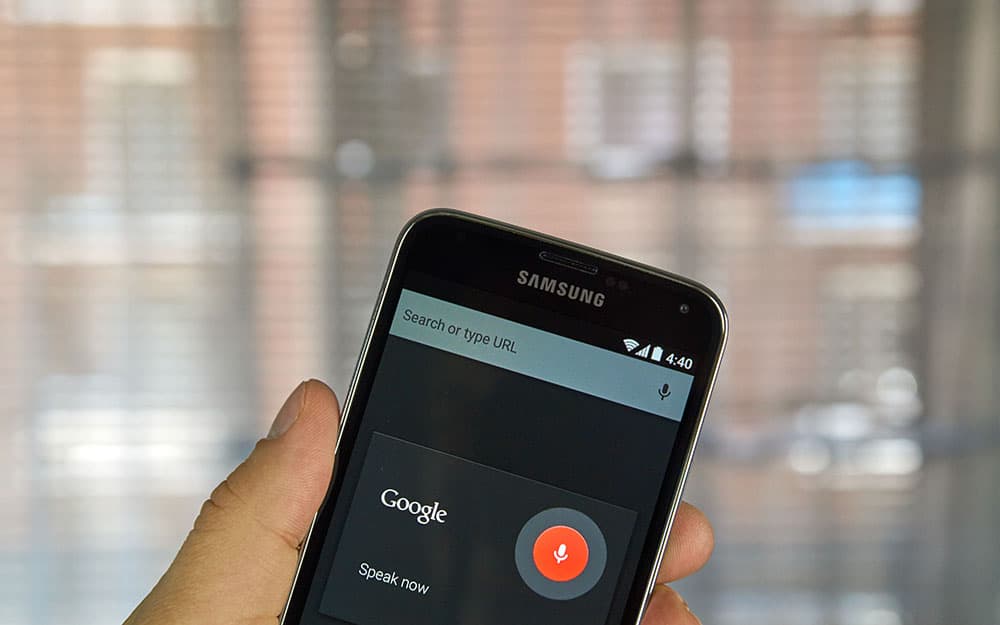
Will regulations fundamentally change the publishing market?
John, Ben, Marieke: Maybe.
Anita: Yes.
Do you think digital ad rates will keep going up?
Unanimous, “yes”. All panelists agreed.
Do you think there will be a continuance of conglomeration in media?
Unanimous, “yes”. This was something they all agreed upon equally.
Will it get harder for the little guys in publishing?
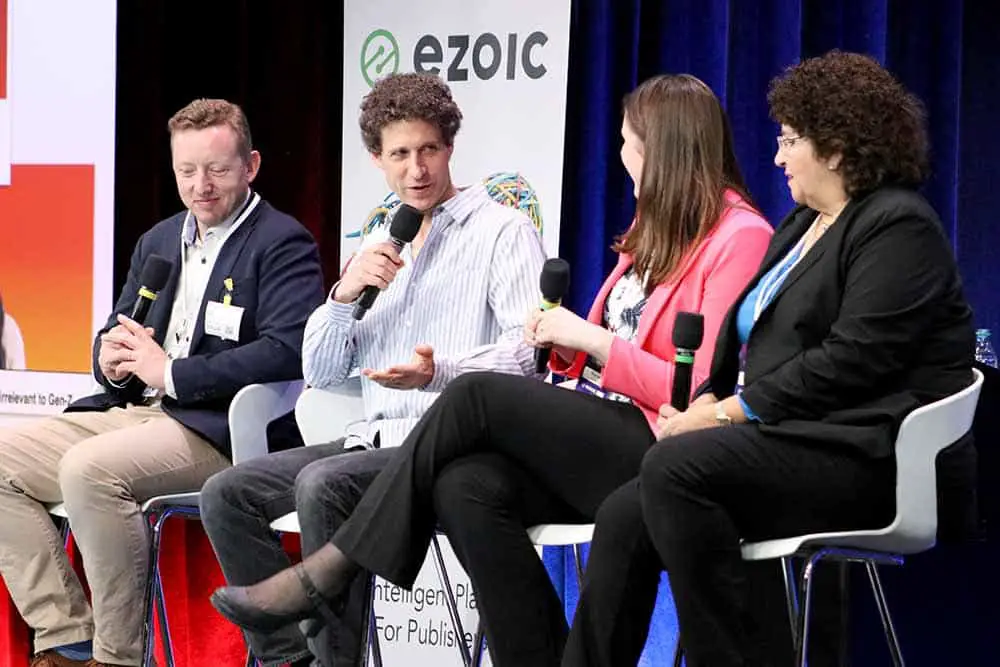
Anita and Ben: Maybe.
John: No.
Marieke: Yes. If the number of organic results gets smaller then there are fewer websites that can compete. Then, only Google’s answer boxes and some large websites will show up on the first page, and that will make it harder on the little guys in publishing.
You see more and more of the search result being occupied by either ads or answer boxes.
Anita: I see some good and some bad. I think some really positive things have happened, like the Google publishing partner program and also the fact that we have more tools available to us, like the Yoast plug-in; I can remember back in the 1.5 version of WordPress and how hard it was to do anything.
I think the revenue potential is really good. Then there are things that make it harder, like GDPR, which adds a layer of complexity with all the technology around ad serving and websites. It’s getting harder to keep up, so you really need the right tools.
Questions from publishers in the audience…
AUDIENCE: I tried AMP in the past through WordPress plugin and it changed my URLs to include Google or AMP. If I were to try AMP again, would it change them again? I’m concerned about links and redirects.
Ben: Since you were using a WordPress plugin, that’s why that happened. I think in general, most users don’t ever see ‘Google com’; if you’re on a phone, you don’t see that. I think it’s more of a problem if you try to do certain things like personalization or load content because google.com is then your domain instead of your domain.
For example, our website amp.dev was built on AMP and there is no ‘AMP’ in the paths. Any URL can use AMP and it doesn’t require there to be an ‘AMP’ in the URL at all.
There are various ways to use the plugin. One way is to have two versions of your site: the desktop version and the AMP version, which would show up on mobile. Or, you could have just the AMP version, which works on every device, which we recommend. Your links are your own though, so if you link to a certain page on your site, there should still be a version of it that doesn’t have ‘AMP’ at the end.
Marieke: Google actually worked very closely with the creators of the new version of the WordPress plugin, whereas the version before that they didn’t work really closely at all.
AUDIENCE: With Adsense, you have to manually create separate ad units to show an AMP; are the ad payouts going to be different on AMP?
LEARN MORE ABOUT AMP AD RATE STUDIES HERE
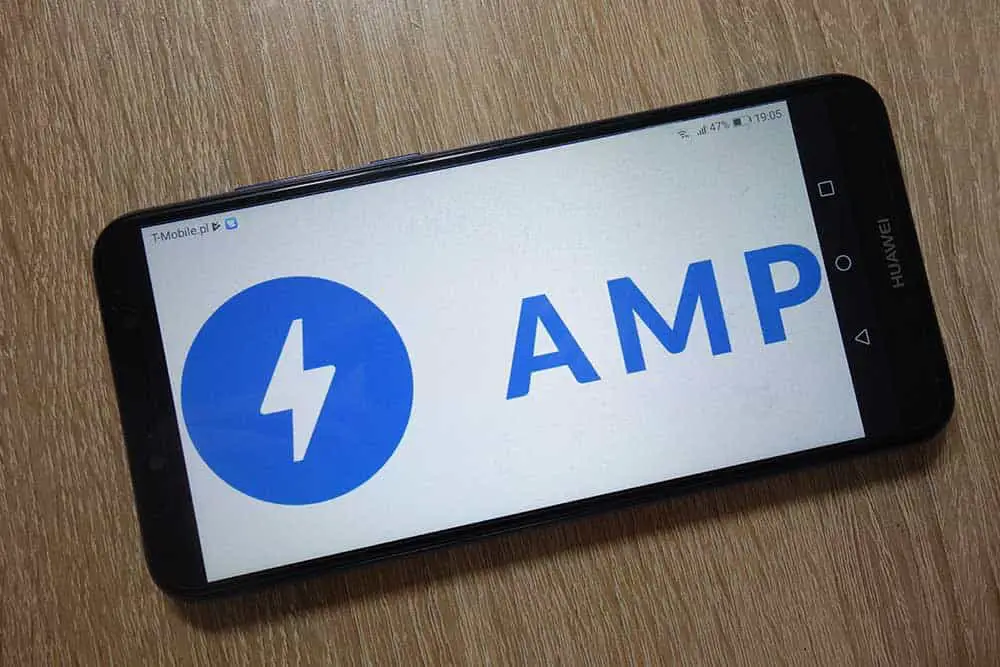
Ben: I know that there are those who have had a better experience with ads on AMP and now make more money and there are those who make less money. What I have seen often are the people who use AMP all a sudden do worse because they had all the same ad placements before and they’ve spent years optimizing their placements for their original site.
Then, suddenly, it’s an AMP page, and you don’t allow certain kinds of ads anymore and the page would be different in some ways, so it’s really important to specifically optimize your AMP page for ads.
There’s a company in Spain that converts various sites onto AMP. At first, the ads might be different and they may make less money. They work on optimizing the ads, trying out different kinds of formats, and by the end, they’re just as good or better, but it depends on your experience; a publisher might double their money and some are cut in half.
The idea of AMP is that it’s a better user experience, so visitors will stay on the site for longer, and view a few more ads. Most commonly what happens to people is the WordPress plugin generates these pages that aren’t very good and then they never look at them and realize that it’s not performing well. It takes some work to make things as good as they were before. But also, if AMP doesn’t work for you, then don’t use AMP. If you’re losing money or if it’s painful to use, then make the site fast on your own.
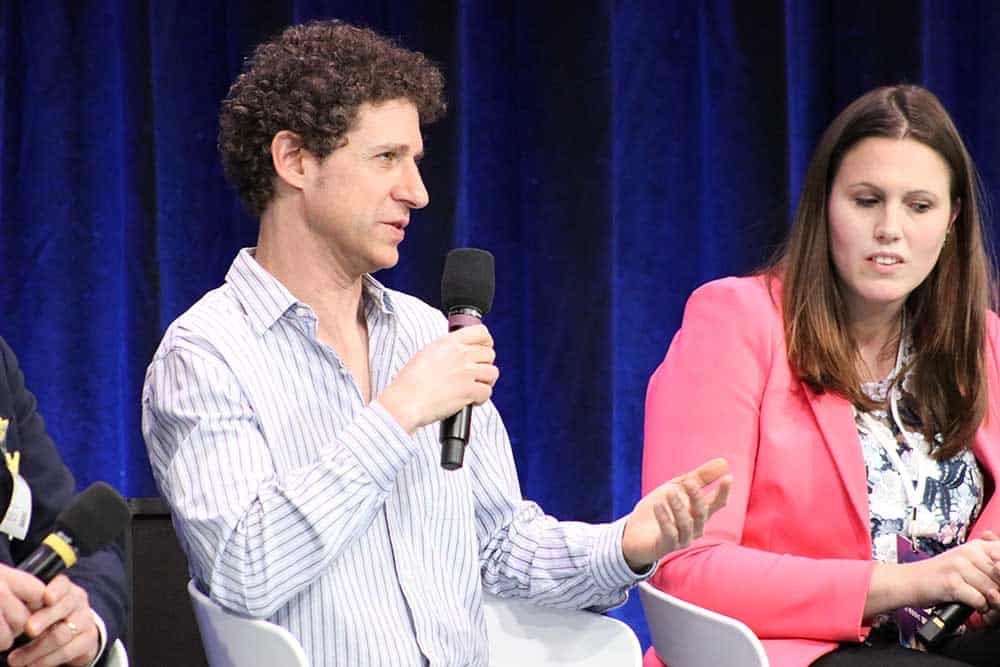
John: I think one of the reasons you could make less money using AMP is because you’re not getting the pageviews per visit that you would get from a normal web page because of the carousel. People look at one and then they can swipe left or right, and they leave your site, so the pageviews per visit are different.
It’s quite hard to be able to get that same depth of user visit, and I guess the idea is that if you’re in the carousel, you get compensated by having more traffic. I think that the frustration certainly for us is that we can’t bust the Google cache, so being able to personalize the ads in any way is really tough. We can do, but it is hard.
Tyler (moderator and researcher): Ben had a good point about ad placement. One of the things we’ve learned from our customers that use Ezoic on their AMP pages is often the layouts on the AMP pages, once you actually go in and manually set different ad placeholders, bring in pretty good revenue and I think that there is something to be said about the fact that people kind of turn on AMP and just kind of hope that the revenue is going to be the same as it is in the regular mobile site. It’s a little bit more involved than that.
AUDIENCE: Do Taboola and Outbrain work on AMP?
John: I think they do.
Ben: I’m not sure. I’ve seen them before a lot on sites with these little recommended articles. I think they could?
Tyler: I don’t know that I’ve ever seen one on an AMP article.
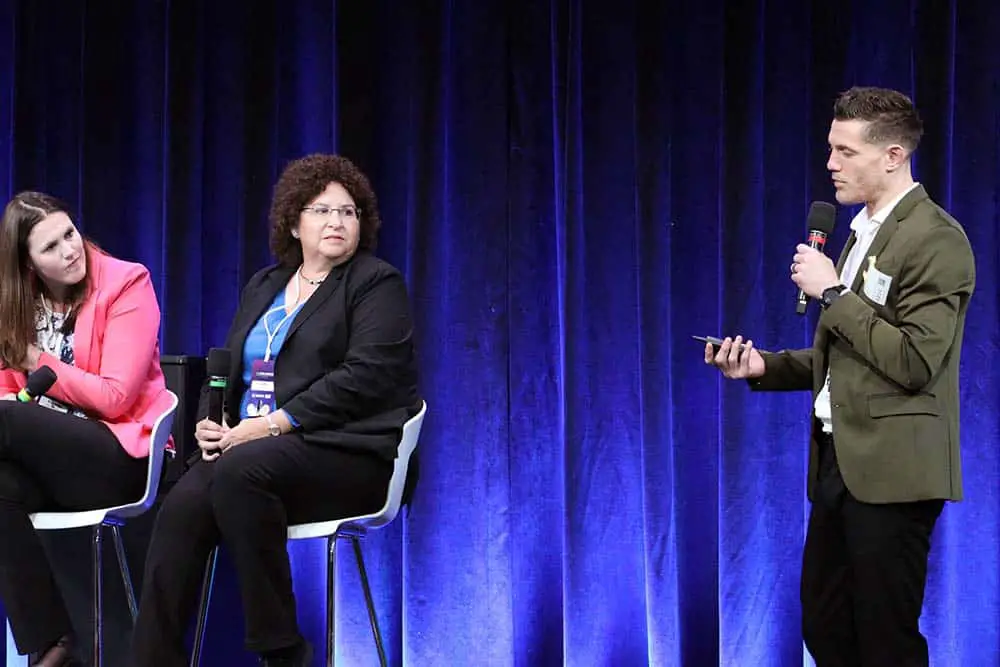
AUDIENCE: What do you see happening with ad blockers?
Ben: Chrome also is now blocking certain kinds of ads as well. As a publisher, I would just try to serve nicer ads that aren’t as intrusive. I can’t speak for Google, but many people at Google talking about these things are often concerned with ads being blocked, so their answer is to try to make ads better.
So I try to discourage people from making these ads that are more intrusive, so then users mind ads less and revenue still accrues to those who have ads on their sites. Another solution is a way to make money without having ads.
Google has tried a couple of things where people can pay as they go. Also, AMP supports AMP later pay, for example, where you can pay a few micropayments for every site you go to. But, as we were saying before, people like things that are free. So, nothing has quite caught on, but hopefully one of them will, because maybe there are more ways to make money aside from ads.
I’ve seen things before the other initiatives Google has tried to allow people to opt-in to pay per view. Isn’t it true in the UK, and other parts of Europe, you pay a license for your television and it supports the BBC and so on? In the U.S., it’s all free TV.
Marieke: Yes, but you have ads every 10 minutes. We don’t have that.
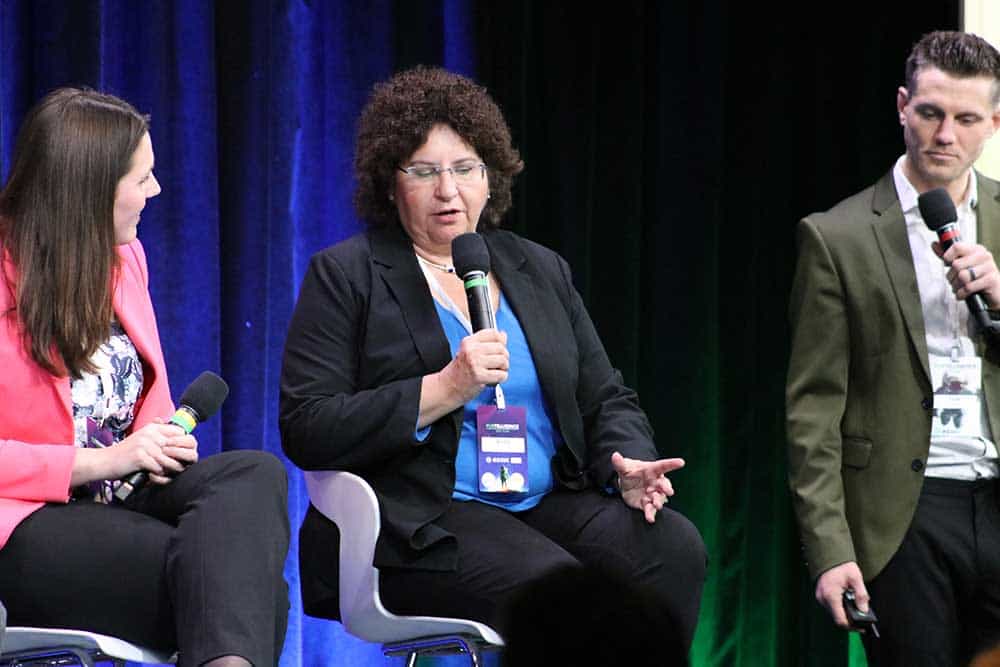
John: Yes that’s true. Some people don’t know the Google policy on ad blockers, so I’ll just reiterate that you’re not allowed to use Google ads if you are trying to put ads into Adblock users; that will get you kicked out of Google. So, number one, I wouldn’t do that, and number two, I wouldn’t engage with companies offering a service to do that for you.
It’s really hard to track whether an ad would have shown or not. and you have to rely on these ‘ad block recovery’ companies to tell you how many ads they ‘recovered’ for you, and to be honest it seems like you’re in a bit of a shakedown situation.
I think the incremental revenue is not necessarily going to be worth it. Of the 60-70 % of visits on mobile, the number of visitors who are using ad blockers on mobile is actually really small. The only place where it’s a really big problem is in Germany, where all of the newspapers in the country ran ads for quite a long time saying ‘don’t use ad blockers’ and guess what? People started using ad blockers a lot more.
Anita: We haven’t actually encountered what we consider a major revenue drop from people using ad blockers. I think I remember reading a survey where they found that people who said they use ad blockers were really not talking about ad blockers, they were talking about pop-up windows and things like that.
Ad blockers are a very rare kind of thing now. The highly technical people who are really savvy use them, but the vast majority of our audience even know what these things are.
Tyler: I know there’s been some research that shows that ad blocking seems to kind of be tailing off, but in countries like the EU and some specific niches, it’s much higher.
I think Ben has the right idea of making your site as non-intrusive as possible to user experience, because one of the things that’s negative about serving ads to people with ad blocker is that the ad blockers get progressively more targeted at what types of ads they block, and eventually, they get so sophisticated that they actually start breaking sites.

AUDIENCE: We’re largely an educational site, and one thing we’ve struggled with is balancing between being found through search versus giving information to people about things that they weren’t aware they didn’t know. Do you have any advice balancing between the two?
Marieke: Well, if it’s useful to know, then they will have a problem. For example, a lot of people weren’t searching for an SEO plugin, but they were searching for ways to get more traffic.
There was this medicine that cured bleeding gums; nobody searched for this medicine, but people were searching for bleeding gums. People started getting better, and then the product got a lot of attention and was sold more. I would say focus on the problem rather than the solution because people are searching for their problems because they don’t know the solution yet.
AUDIENCE: At this publishing event, we have heard a lot about AMP pages, but there’s not a single image we’ve seen in any of the presentations that show monetization. I think what would make us publishers is to see more focus on components that can help us monetize. The economics of creating the content is expensive and it’s getting harder for us to actually make money.
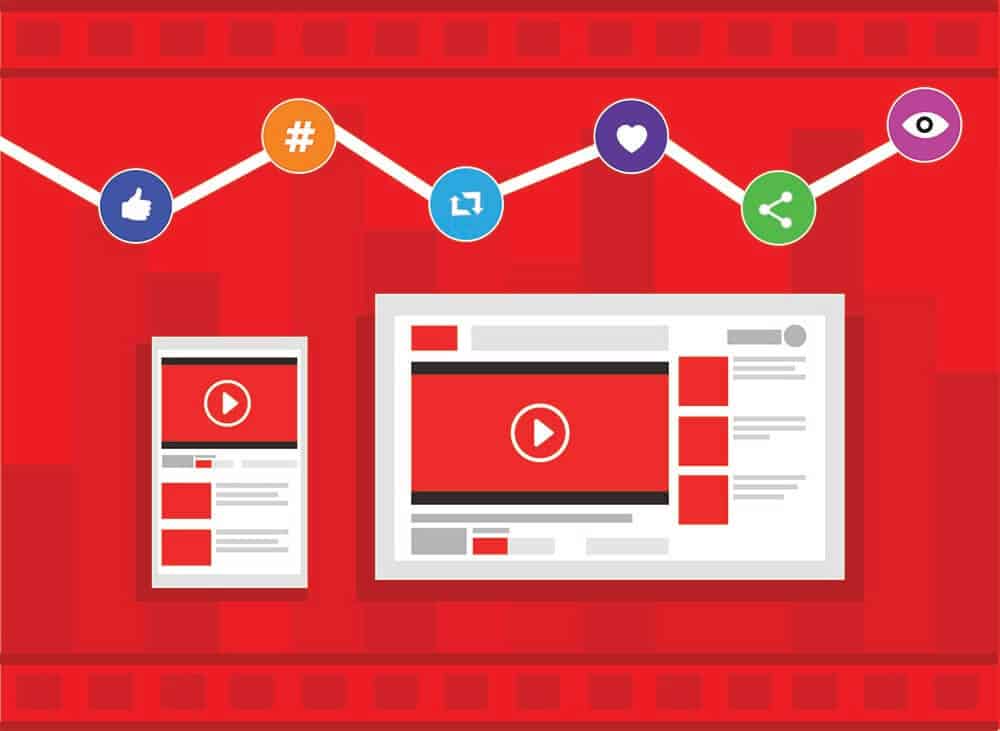
Ben: I know money is always a tough thing and it’s not really an area I specialize in, but there’s a variety of blog posts about ad monetization and ways to monetize, and there’s also a couple of talks on YouTube that have been given at AMP conferences before.
John: I think the silver lining in this is that with the first-price auction thing that happened last week, server-to-server bidding by Google will remove the necessity for header bidding, which is obviously in the header with JavaScript.
So, that current disadvantage is going to go away or get better, we just don’t know when or how much better it’s going to get and how quickly. How we sort of solved this with the Ezoic system is you match the predicted value of an ad by adjusting the bid floor dynamically on a per-impression basis, and if you can do that, that effectively gives you a floor for the price, which you would have gotten through a header bidder.
That’s one of the useful things about header bidding is it does give you a floor where you might not have had one for an ad exchange, so it’s not all bad news for AMP; it should get better.
AUDIENCE: I write for a music news website and we cover nightly reviews of a given band on tour. Oftentimes, the same band will play multiple nights in a row but play a different set every night. How would you suggest organizing keywords and that content so that it’s not inherently competing with itself?

One of our SEO panelists from earlier in the day had a great answer and was brought up to answer the question.
Carolyn (ESPN’s Head of SEO): So, you’re using Google News and WordPress, and you have a category-level page on your site for that band. There are tools you can use to add content to the category level page so it’s not just a list of all the articles.
What I would do is make sure that you have your structure correct and you have breadcrumbs, so every single one of those articles about that band is going to have a breadcrumb that points back up to the category page for that band.
What you need to try to do is not necessarily have each one of these news articles ranked, but you’re going to try to have that category level page rank because that’s going to be your trophy term in the universal results, and then it’s going to be the news results, and you probably need AMP to get in that nice news carousel.
Make sure you have new schema on the page, too, to make sure that you’re getting the daily reports in Google News because that’s where you’re going to get all that traffic for those pages. Then, the incremental value that those pages accumulate is going to point back up to the category level page, which is going to be your trophy term for the band name.
AUDIENCE: Do you have any advice on best practices for publishers for organizing archive or category pages? What about having boxes that you could click for different categories, like a box for ‘kitchen’ and a box for ‘floors’, and if you checkmark both, you would only get results for ‘kitchen floors.’
Marieke: At Yoast, we have those category pages and then we have the three or five most important ones we feature at the top of each category, and then below that, we have the rest of the content in date-order. So you could do something like that. I think the boxes could work as a search function but I don’t know if that so that’s a good idea UX-wise or for SEO strategy. If you have a lot of content, the checkboxes could be a good UX way to find a specific article.
AUDIENCE: There’s a setting in Yoast called canonical URL, so if you have two posts that are similar and you want to prioritize one, a canonical URL points to the one that’s more important. Is that still a good thing to do?
Marieke: Well, canonical actually made for content that is exactly the same, so it’s telling Google ‘I already have this content in another place,’ and that’s when you put in a canonical URL. If it’s almost the same, you could do the same thing, but it’s not for similar content.
Carolyn (From ESPN adding her insights): For SEO purposes, you should have one article that is about one thing. If you have two articles that are so close that you feel like you need to redirect one to the other or tell Google that one’s more important than the other, then you need to get rid of the lesser one or combine them on the same URL.
She’s right —the way you’re describing using canonical, that’s not the intention. It’s not even a good temporary solution.
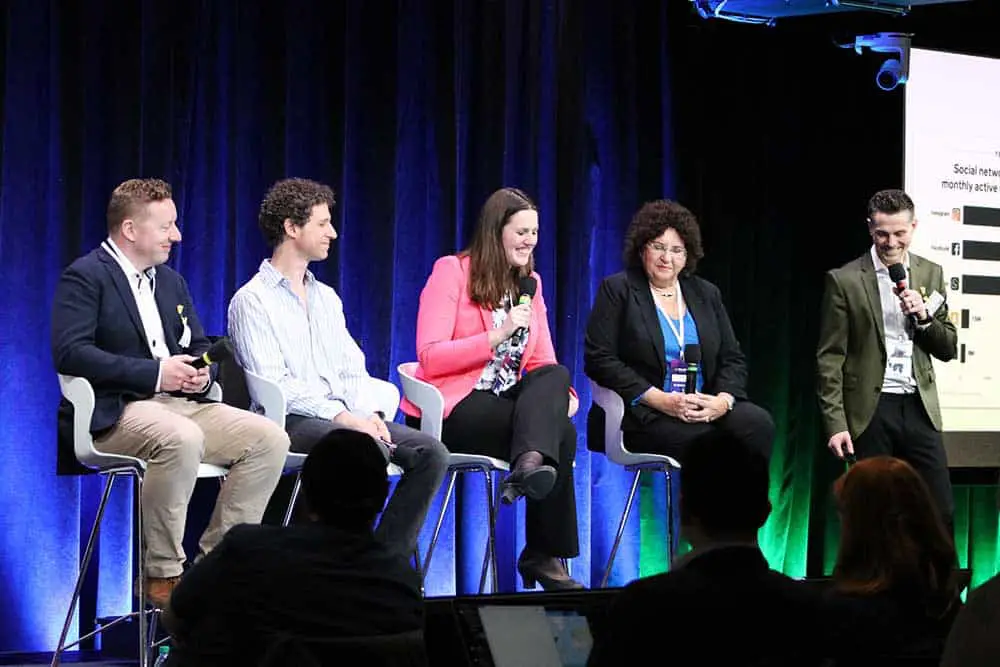
That was the last question of the day from the audience.
Our moderator, Tyler Bishop, then thanked all the digital publishing experts for joining the panel.
If you have any questions about the future of digital publishing that weren’t answered in this panel leave them in the comments below. Tyler — and many of the panelists — may have an opportunity to chime in with answers in the comments section.
Featured Content
Checkout this popular and trending content

Ranking In Universal Search Results: Video Is The Secret
See how Flickify can become the ultimate SEO hack for sites missing out on rankings because of a lack of video.
Announcement

Ezoic Edge: The Fastest Way To Load Pages. Period.
Ezoic announces an industry-first edge content delivery network for websites and creators; bringing the fastest pages on the web to Ezoic publishers.
Launch

Ezoic Unveils New Enterprise Program: Empowering Creators to Scale and Succeed
Ezoic recently announced a higher level designed for publishers that have reached that ultimate stage of growth. See what it means for Ezoic users.
Announcement
